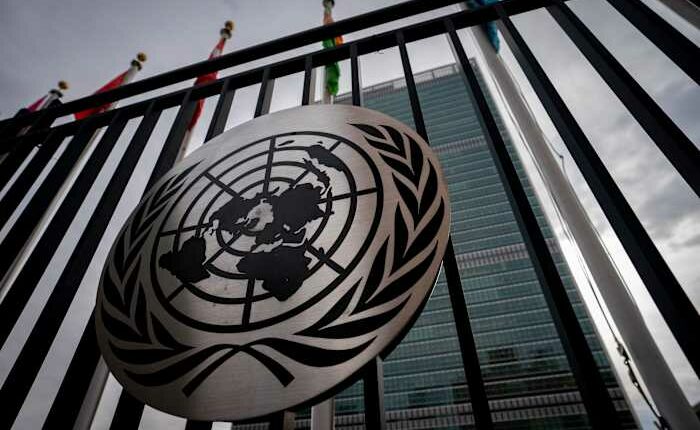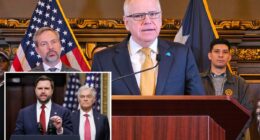Share this @internewscast.com

NEW YORK – Despite grappling with reductions and questions about its continued relevance, the United Nations will still attract foundations and nonprofits to New York next week for a busy lineup of conferences, meetings, social events, and dinners alongside its general assembly of global leaders.
But the uncertainty has already had an impact.
The Gates Foundation typically releases a report on progress toward global development goals ahead of the U.N. General Assembly. However, this year’s release has been postponed as the extent of future foreign aid and global health funding remains uncertain. Former President Bill Clinton announced that the Clinton Global Initiative, which started its annual meeting adjacent to the U.N. assembly in 2005, will adopt a new format this year, encouraging business, political, and philanthropic leaders to create new initiatives during the two-day event.
The changes are among the signals the U.N. General Assembly — also known as UNGA Week among attendees — will be different this year.
The United States, as the U.N.’s largest donor, has halted funding or attempted to retrieve it, leading to significant layoffs and program cuts across U.N. agencies. Also, the Security Council, which was established post-World War II to prevent conflicts, has not intervened in two major ongoing wars.
The world’s uncertainty has made this year’s UNGA Week even more important, say some ready to join in the gatherings.
Kevin Sheekey, senior adviser to billionaire and former New York mayor Mike Bloomberg, stated, “It is still the only forum where the entire world convenes, and that alone, in my view, justifies its existence.”
Since 2017, Bloomberg’s organization has held a forum next to the U.N. assembly, which Sheekey described as a unique chance for world leaders, businesses, and philanthropies to connect. This year, the focus will shift to global cooperation and investment opportunities in African countries, particularly in sports.
The United Nations Foundation, established by Ted Turner in 1989 to foster collaboration with the U.N., keeps track of public events occurring alongside the assembly. According to George Hampton, one of the foundation’s executive directors, the event count is similar to previous years, although there seems to be a rise in smaller, more focused discussions where more candid and meaningful dialogues occur.
“It is clear that the space we have to solve problems is shrinking, the kind of global cooperation table is shrinking as the problems themselves grow,” Hampton said. “So it does feel there’s a new urgency, a new sense that this time matters more than those before it.”
Clinton Global Initiative CEO Gregory Milne said the changes the nonprofit plans for this year’s meeting are similar to how it responded to the Haiti earthquake in 2010 and the COVID-19 pandemic.
“This is a critical moment for the global development community,” he said. “But we also know that the CGI community and thousands of organizations that span the public and private sector have always worked to meet the unique and urgent challenges of the time.”
An early event, hosted Thursday at the Ford Foundation, was Free Future, which focuses on ending gender-based violence. Speakers, including former Liberian president and Nobel Peace Prize winner Ellen Johnson Sirleaf, reflected on the 30th anniversary of the U.N. conference on women in Beijing in 1995, where countries made many pledges to move toward gender equality.
She said while there’s been progress in terms of the promotion of women leaders and access to opportunity, “We have not done enough.”
The conference this year was co-hosted by Pivotal, Melinda French Gates’ organization, and highlighted the economic toll that violence takes.
“Violence has a cost,” said Monica Aleman, international program director at the Ford Foundation, adding, “that money can make a difference in bringing a solution, whether that is through cash transfers or other economic opportunities that you can offer survivors.”
The event, which convened funders, private companies, advocates and grantees, is also meant to fortify and inspire attendees in advance of what will be for many, a packed week of meetings on the U.N. sidelines.
Celiné Justice, of Pivotal Ventures, said part of what her organization will be doing is “really listening for opportunities to bring this issue into the room, so that it doesn’t get forgotten.”
She said more than ever, philanthropies need to work together and to also build partnerships beyond their normal allies.
___
Associated Press coverage of philanthropy and nonprofits receives support through the AP’s collaboration with The Conversation US, with funding from Lilly Endowment Inc. The AP is solely responsible for this content. For all of AP’s philanthropy coverage, visit https://apnews.com/hub/philanthropy.
Copyright 2025 The Associated Press. All rights reserved. This material may not be published, broadcast, rewritten or redistributed without permission.











